Services
SERVICES
SOLUTIONS
TECHNOLOGIES
Industries
Insights
TRENDING TOPICS
INDUSTRY-RELATED TOPICS
OUR EXPERTS

February 25, 2025
25+ years in healthcare software development
Delivering HIPAA-, HITECH-, FDA-, and IEC 62304-compliant healthcare software
Practical knowledge of international healthcare data standards and coding procedures, including DICOM, FHIR, ICD-10, and CPT
Among notable providers in Forrester’s 2024 Modern Application Development Services Landscape report
Internal Healthcare Center of Excellence
expected global pediatric telehealth market CAGR between 2024 and 2031
children in the US need more than an hour to get to a regional pediatric hospital
of children and adolescents surveyed are satisfied with their telemedicine visits
of primary care physicians provide comparable care quality in virtual and office visits
While every platform is different, most of them possess basic functionality for providing effective virtual care.
Telemedicine for pediatrics benefits both patients and medical practices, allowing for extended service reach and more flexibility for medical care teams and patients.
Telehealth enables the continuity of care, allowing pediatric clients to feel more secure knowing they can
consult a specialist when needed. Children usually get very frustrated with frequent changes of the medical
team, and visiting the same doctors and nurses benefits their mental well-being. Moreover, most caregivers
appreciate the ability to consult about their child’s health without taking time off from work.
All of the above contributes to the patient's satisfaction with the pediatric practice, which in turn helps build
trust and willingness to turn to a particular provider in the future.
A telehealth platform helps pediatric practices expand the variety of their services and reduce expenses by performing video check-ups, sending follow-ups to patients, and communicating with them synchronously and asynchronously without opening additional facilities. Many specialists, like private practice owners, can always consult patients remotely via a virtual visit, saving on office expenses.
Pediatric telemedicine apps facilitating remote care to patients help medical personnel build more convenient schedules and prevent burnout caused by working long hours, having limited freedom or flexibility, and unpredictable work schedules. In addition, built-in payment modules in telemedicine platforms increase convenience and transparency around pricing and reimbursement due to automated payment processing and verification, allowing medical specialists to better control the compensation flow and streamlining the entire revenue cycle.
Telemedicine apps allow patients to receive urgent care faster, increasing the chances of a milder course of
illness and faster recovery. Remote patient and treatment monitoring also reduces the risks of hospital
readmissions and emergency department visits.
Regular check-ups and the abundance of educational materials provided by telehealth platforms also contribute
to patient education. This is especially valuable to first-time parents and adolescents who are in great need
of proper guidance and psychological support.
As doctors have flexible timetables and are more accessible, they can schedule a bigger number of consultations. Moreover, clinicians can offer convenient terms that benefit children with complex medical conditions. In this case, telemedicine for pediatrics speeds up diagnosing and treatment, reduces costs, and prevents unanticipated hospitalization. All of this significantly boosts patient and family experience, encouraging people to resort to telehealth solutions more in the future.
As telemedicine reduces the time needed to receive care and helps caregivers avoid the waiting room when it’s not necessary, it maximizes convenience, which is essential for a healthcare organization’s reputation. Pediatricians can provide more efficient care and triage clinical presentations, giving equal opportunities to people with diverse socioeconomic, cultural, and geographical capabilities. All things considered, pediatric telecare aims to create a patient-centric experience that can be a decisive factor when choosing a healthcare provider for the long-term perspective.
A basic pediatric telemedicine platform is sufficient to securely connect patients to pediatric practices. However, by integrating it with other medical software, medical providers can extend the capabilities of a tool and create a virtual hospital to provide a level of care comparable to in-person visits.
Enables pediatricians to access patients’ full medical history
Supplies care providers with data on patients’ vitals, helps conduct remote examinations, and alerts patients and doctors about condition changes
Simplifies medication prescriptions, orders, and refills and helps patients adhere to their treatment plans
Contributes to the accuracy of diagnostics and helps predict disease progression
Simplifies pediatric care reimbursements through pre-built payment gateways and connectivity with modules that allow patients to pay providers for their services
Allows clinicians and patients to access CT scans, X-rays, ultrasounds, and other medical images
Simplifies appointment scheduling, billing, and other routine processes
Streamlines laboratory data management, improves data accuracy, and facilitates data exchange between lab personnel, healthcare providers, and patients
While pediatric telehealth software can’t replace in-person visits where children and adolescents can get vaccinations, diagnostic tests, and physical examinations, it’s still a potent opportunity to augment traditional approaches to treatment. Here are some of the industry leaders in the pediatric telehealth market that have the largest market share and influence on the industry development vector.
Maven is a platform hosting a network of 30+ providers representing more than 350 pediatric specialties
– from midwives and lactation specialists to pediatricians and behavioral therapists. It offers health
plans for any stage of family life, including conception and newborn care, pediatrics, and parenting for
teens.
Patients can contact specialists round-the-clock with urgent medical questions and get virtual pediatric
consultations, referrals, and community support via a patient portal. The platform also offers a plethora
of educational materials in the format of FAQs and articles. The clinic is fully inclusive, helping patients
with different capabilities, needs, and backgrounds, and accepts major insurance plans and other types of
reimbursements.
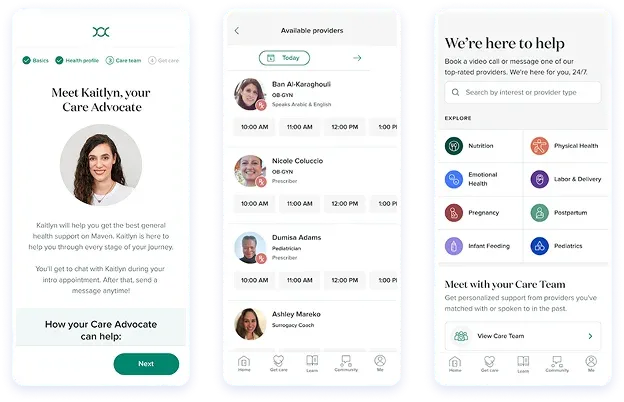
Image title: Maven telehealth app interface
Image source: play.google.com — Maven Clinic
Teladoc Health, labeled as the first and largest telemedicine company in the United States, offers an
integrated enterprise platform called Solo™. This tool, aimed at healthcare organizations, can be
linked with existing IT systems, including EMRs, helping care teams provide scheduled and on-demand
remote care via preferred devices. This HIPAA-compliant and HITRUST-certified platform supports virtual
nursing and virtual sitting workflows and allows medical specialists to review all-embracing patient
records (encounters, imaging, etc.) in one place.
For individuals, there are three options available: general medical care, mental health support, and nutrition
consultations. Patients with or without insurance can connect with US board-certified doctors and nurse practitioners
anytime by phone, web, or app and obtain medical care for a variety of conditions.

Image title: Teladoc Health platform interface
Image source: teladochealth.com — Your child is unique. Their healthcare should be too
American Well, or Amwell, is one of the top US telehealth companies that allows care professionals to
conduct video telehealth visits for millions of consumers with a platform called Converge™, making it
possible for patients to receive 24/7 hybrid care across the country.
Amwell and CVS are collaborating to run the pharmacy chain’s online care services. Additionally, American
Well established a global partnership with Philips to integrate their mobile telehealth services into a variety
of Philips products. As Amwell is a technology-agnostic platform, medical care can be delivered through smartphones,
tablets, computers, and kiosks.

Kiddo Health is an AI-enabled connected care platform that helps children with behavioral and metabolic
health conditions, such as autism spectrum disorders, obesity, and diabetes, track over 12 biomarkers to
receive timely and quality help. The platform collects data, generates alerts, and provides tips so that
families and providers can make better decisions about tailored treatment.
Kiddo was selected as a finalist for the Digital Health Awards in 2023 for the Best in Class track in the
inaugural Pediatric/Adolescent Care Innovation category. As a finalist, Kiddo has established itself as a
leader in pediatric healthcare by offering whole-child insights for enhancing health outcomes, lowering overall
care costs, and preserving a high quality of life.
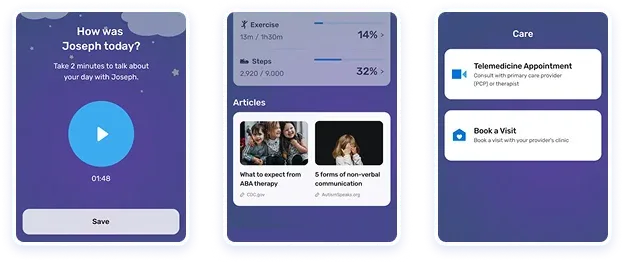
Image title: Kiddo Health app
Image source: kiddo.health
Anytime Telecare is among the companies developing telehealth systems specifically designed for
pediatrics and triggering high competitiveness in the market, according to Arizton Advisory and
Intelligence. They empower parents with round-the-clock access to qualified pediatricians and nurses,
facilitating excellent pediatric care provisioning whenever and wherever it’s needed.
The organization offers Anytime Pediatrics, a platform for remote pediatric care. Its capabilities encompass
real-time medical advice with nurse triage, HIPAA compliance, and flexible virtual care options like chats,
instant links, virtual walk-ins, or scheduled visits. Nurses can use the platform to easily and securely
exchange patient details, prescription needs, and updates with doctors, pharmacists, and parents, bypassing
laborious callbacks.
No matter if it’s after hours or busy office times, pediatric patients and their families can get in touch
with seasoned nurses to assess health issues, ask for medical advice, and determine the appropriate care
courses of action. At the same time, all participants can be sure that their communication is protected from
data breaches.
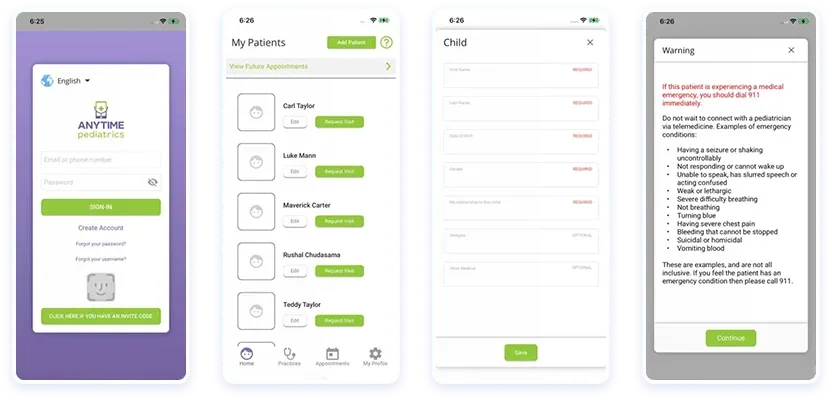
Image title: Anytime Pediatrics app interface
Image source: apps.apple.com — Anytime Pediatrics
Even though there are numerous telemedicine platforms on the market, pediatricians often get a custom-built solution or tweak an out-of-the-box platform to cover their unique needs. To implement a telehealth solution, pediatric organizations usually go through the following five stages:
Requirements gathering
A team of healthcare specialists work together with the IT department or a consultant to understand the main requirements the healthcare organization has for the software.
Project planning
The organization’s representatives and the vendor’s team draw up a detailed plan of the implementation process that consists of hardware and network preparation, solution installation, integration, and post-implementation tuning.
Development
A secure and compliant software is developed by the vendor with an interface matching the organization’s brand style. During this stage, the solution is also connected with necessary third-party services and tested for bugs.
Deployment & training
The development team deploys the telehealth solution to the production environment. The team or a third-party consultant can also conduct training sessions for personnel at this stage.
Support & modernization
Most vendors offer post-implementation support to resolve any issues that come up during their solution’s usage. They can also upgrade the telemedicine solution as the organization grows and new technologies come to the market.
Telehealth plays a significant role in providing healthcare. Yet, its adoption can still be hampered due to the following reasons.
Technology challenges | According to Frontiers in Medicine research, 80% of providers indicated inadequate technical support as one of the primary challenges to successful video visits. This
entails a confusing design of the video-visit system, poor internet connectivity, and low audio/visual quality.
The issue is even more pronounced in rural and underserved communities that are especially susceptible to technology
barriers. | To successfully implement pediatric telemedicine, providers should opt for user-friendly systems and robust hardware. They should also ensure stable access to the internet for synchronous and asynchronous telehealth capabilities, adequate training, and uninterrupted technical support. Telehealth system design should allow for active collaboration between all stakeholders, including patients and providers and follow a user-centered approach. |
|---|---|---|
Privacy & security | Pediatric telehealth platforms store and transmit sensitive information about underage patients, which
raises major privacy concerns among their parents and caregivers. When data confidentiality is
jeopardized, people’s trust in telehealth and its ability to improve medical care effectiveness and
quality is lost. | To improve the security and privacy of telehealth services, healthcare delivery organizations should implement HIPAA-compliant applications that enable encryption of the data at rest and in transit, and adhere to the principle of least privilege, managing access to patient information and medical devices. |
Software costs | Telemedicine software adoption and maintenance is rather expensive, which can slow down its
implementation in budget-constrained organizations, particularly in rural areas that need pediatric
telehealth solutions the most. | To tackle the issue of high software costs, healthcare providers should consider purchasing cloud-based software that allows for lower initial financial investments and a gradual increase of the required capacity, storage, and feature sets later on. |
We tailor pediatric telehealth software to comply with the organization’s capability needs and strict data management regulations. Our experts meticulously gather system and business requirements to propose a well-suited solution that can fit in with the existing ecosystem.
We can integrate the telemedicine solution with other systems, including IoT devices, billing software, data analytics tools, and CRM software. We set up robust and secure integrations, helping healthcare providers create a unified ecosystem where clinicians can access the needed information with ease and develop a personalized treatment plan for a particular patient.
Once the system is operating, we enhance its performance and fine-tune its components to meet increasing workload, storage, and functionality demands. We can also integrate it with new third-party tools and enhance it with innovative technologies like AI, ML, and AR/VR.
To ensure frictionless operation and usage of pediatric telehealth software, we provide comprehensive support services. We can fix bugs, eliminate system downtime, and conduct regular security and functionality audits to spot and prevent potential vulnerabilities.

Most patients who have tried some kind of telehealth services now want to continue using telemedicine due to its round-the-clock accessibility, ease of use, and reduced risk of getting sick in the waiting room. If you want to provide continuous care for your patients, expand your patient base, and reduce the pressure on medical personnel, consider implementing telemedicine software for pediatrics to complement your in-person medical services. In case you lack the required expertise, Itransition’s experts are here to help you choose the best-fitting technology option and carry out its implementation end-to-end, providing personnel training to ensure smooth telemedicine adoption.
Telemedicine is a relatively new technology for the healthcare industry, so both care providers and patients have many questions about it. We gathered the most commonly asked ones for our experts to answer.
Here is an overview of the pediatric telehealth process as well as certain tips clinicians and care teams should follow to ensure their families are well-prepared for a telemedicine visit.
The implementation costs vary significantly depending on the required functionality, but the market average for pediatric telemedicine solution development and implementation is between $50,000 and $350,000. For a more accurate estimation, get a quote from our consultants.
Medicaid, Medicare, and other commercial health plans cover telehealth services to some extent. The reimbursement and copay depend on the plan and the specific state where the services are delivered. For more information, talk to your insurance provider.
Among the big names in the telehealth market are Teladoc Health, Amwell, Oracle Health, Microsoft Cloud for Healthcare, Amazon One Medical, and others.
Pediatric telehealth ensures better service availability, especially in remote areas. It improves patient experience and allows healthcare providers to reduce hospital admissions, diminishing the number of facilities and employees. Coupled with the ability to expand the patient base, healthcare organizations can save costs and give employees and patients more freedom to choose a more suitable time and setting for appointments.
Telemedicine appointments and video visits enable parents to receive high-quality, on-demand consultation as critical first aid before reaching an emergency room or part of routine healthcare checks. Healthcare recipients can reach out to doctors to consult on the following symptoms and conditions in their children or dependents:
Skin conditions | Rashes, cuts, wounds, animal and insect bites, hives |
|---|---|
Gastrointestinal symptoms | Constipation, abdominal pain, diarrhea, vomiting |
Neurological problems | Headaches, weakness, dizziness, tremors |
Respiratory diseases | Seasonal allergies, bronchitis, asthma, coronavirus |
Feeding issues | Breastfeeding challenges, refusing to eat, spitting up, fussiness |
Upper respiratory symptoms | Ear pain, chills, cough, runny or stuffy nose, sinus infection, sore throat |
Genital & urinary issues | Blood in the urine, pain during urination, urinary tract infections |
Eye conditions | Pink eye, infection, irritation, and stye |
Pain & injury | Pain in the arms, legs, and joints, injury consultation |
Infections | Bacterial and fungal infections, colds, flu, strep throat, measles, chickenpox |
Behavioral health | Autism, speech therapy, sensory processing disorder, ADHD, anxiety |
Other conditions | Diabetes, genetic conditions, obesity, neonatal care, fever |

Service
Itransition offers end-to-end custom telemedicine software development and implementation services for healthcare organizations of any size and specialty.

Insights
Explore hospital management software solutions, benefits, and platforms to enhance your institution’s process efficiency, patient care, and communication.
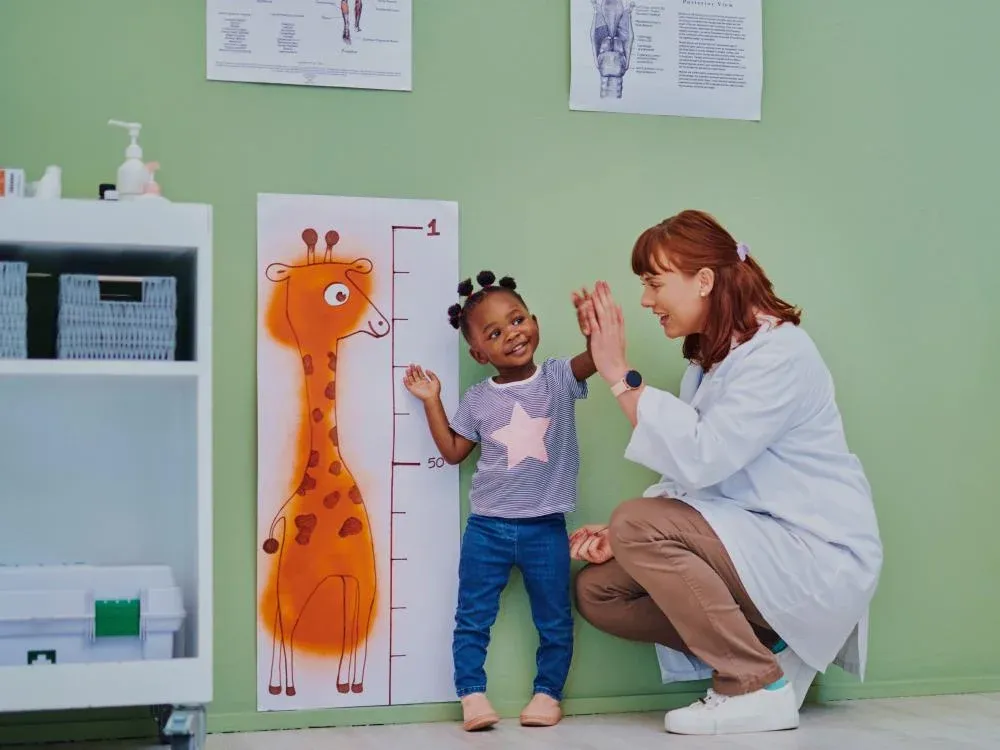
Service
Discover key features and integrations of pediatric EHRs and how to choose and implement a suitable solution, overcoming possible challenges along the way.
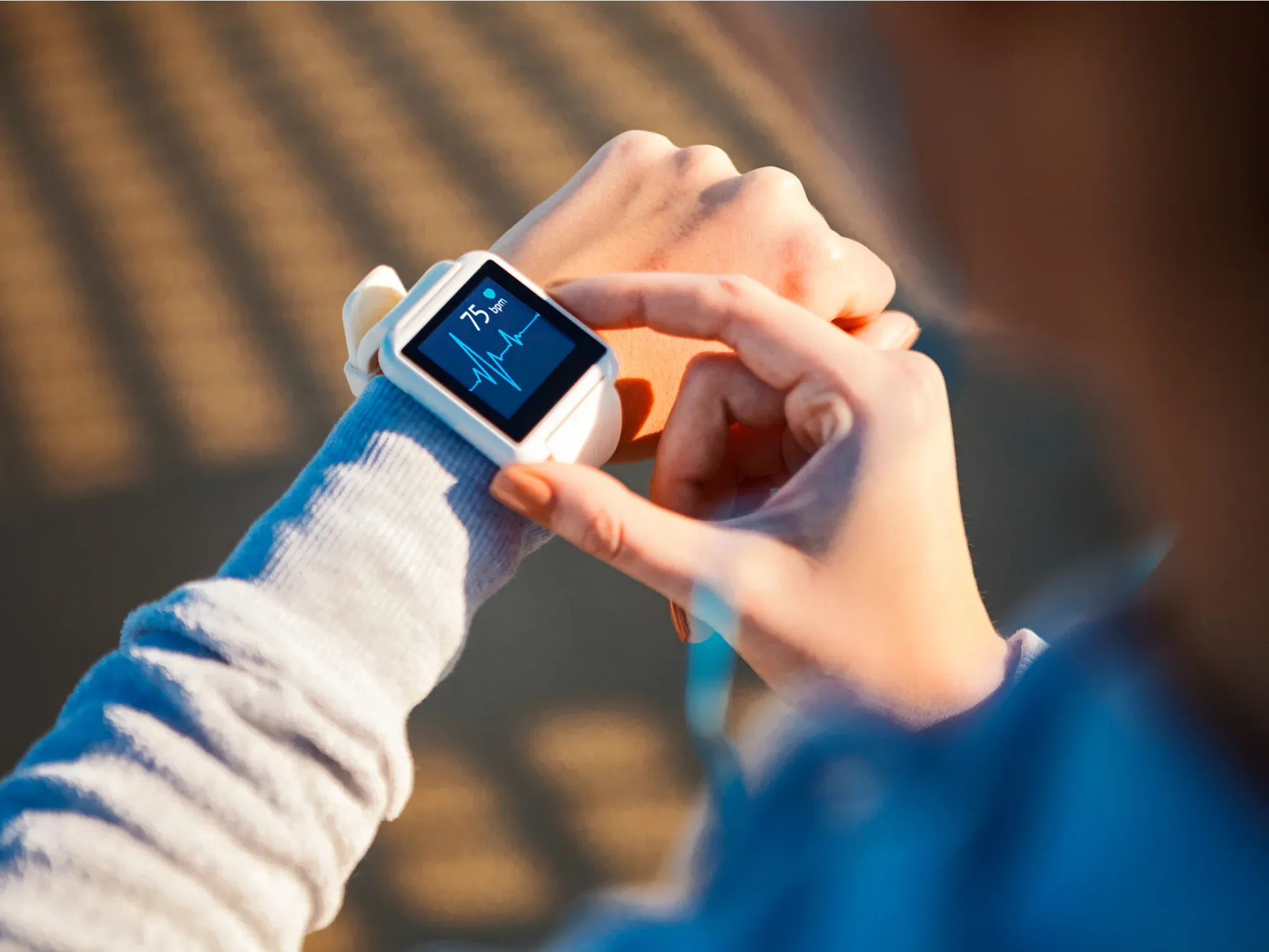
Service
As a medical device software development company, Itransition implements apps for precise diagnostics, streamlined care delivery and management. Get a quote.

Service
Optimize your pharmaceutical inventory and documentation flow to enhance patient care with custom pharmacy management software development services.

Insights
Learn about virtual hospitals, their architecture, integrations, and types. Explore their benefits for doctors and patients and implementation challenges.
Services
EHR
Telehealth